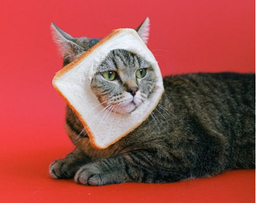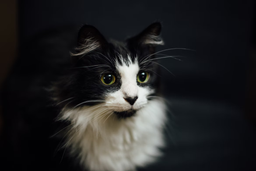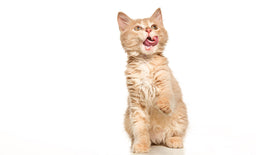What to feed a Bengal kitten for health and vitality
From the earliest age, Bengal kittens start displaying the verve, energy, and playfulness associated with the breed.
Diet is the most important concern in the first stages of your new Bengal’s life, and it’s your responsibility to make sure the food you offer is appropriate from birth until around 12 months when your kitten reaches adulthood.
Bengals can be fussy and sensitive eaters, so whatever your choice of food—wet, semi-moist, dry, or raw—you need to make sure quality is your highest priority.
Need help on what to feed a Bengal kitten? Read on and get all the kitten facts you need!

“How gooooooooooorgeeeeouuuus am I?”
Source: Pixabay
How fast do Bengal kittens grow?
All kittens grow at a phenomenal rate, and Bengals are no exception.
Within the first 6 months, a Bengal kitten is expected to double its weight every couple of weeks and should reach the following approximate milestones:
|
Kitten’s age |
Approximate weight |
|
Newborn |
100 g |
|
2–3 weeks |
170–225 g |
|
4–5 weeks |
225–450 g |
|
8 weeks |
680–900 g |
|
12 weeks |
1.2–1.5 kg |
|
16 weeks |
2–4 kg |
|
18 weeks up to 12 months |
3–5 kg |
Such rapid growth requires a huge number of calories to ensure that development is healthy and steady, including:
- Skeletal growth
- Organ development
- Muscle build
Skeletal growth
Your Bengal kitten’s bones need to grow healthily to ensure your feline can be active and energetic throughout adult life.
Too much Vitamin A in the diet has been linked to bone malformation in kittens, so the diet you opt for should contain only a moderate amount. You should avoid supplementing their diet and choosing food with too high a Vitamin A content.
Organ development
Kittens’ bodies only mature gradually, the key developmental stages being:
|
Kitten age |
What is developing |
|
Birth to 4 weeks |
Basic organ functions, muscles, eyesight, hearing |
|
4–6 weeks |
Immune system, muscles, digestive system, milk teeth |
|
6–8 weeks |
Independent immune system, hunting instincts, muscles, senses of smell and hearing, social skills |
|
2–4 months |
Muscles and skeleton, behavioural traits, digestive system |
|
Over 4 months |
Reproductive system, adult behavioural traits (such as hierarchy) |
The most critical phases in your Bengal kitten’s growth are:
- Weeks 4 to 6—This phase is known as the “immunity gap,” during which the queen’s immune system no longer delivers enough protection, and your kitten’s protective mechanisms haven’t yet matured enough to offer adequate defence against infection
- 2–4 months—As your kitten’s body grows to adult size eating normal food, the calorie requirement peaks. The kitten’s stomach is still small, though, so food needs to be highly energy-dense to deliver the required energy in small, easily-digestible portions
Muscle build
Bengals are famously exuberant and built for agility, with long legs and a lithe body shape. They are known as climbers and hunters, which is why muscle build is crucial for maintaining their ability to indulge their playful nature.
Muscle development starts in kittenhood, and you should make sure their diet promotes lean, not fatty, growth.

Fun and games are guaranteed with a Bengal kitten in the house.
Source: Pixabay
Do Bengal kittens have any special needs?
Bengal kittens can be sensitive (both physically and psychologically), so it’s your responsibility to make sure they are fed the highest quality food and given the mental stimulation they need.
The most common issues affecting Bengal kittens are:
- Stomach upsets
- Lack of mental stimulation
Stomach upsets
Bengal kittens are known to suffer from occasional gastrointestinal problems, resulting in:
Any of these is cause for concern, particularly if the symptoms last more than 24 hours.
With such a rapid growth rate, kittens should eat regularly (albeit small portions), so any digestive issues that lead to not eating for more than a day can have serious consequences.
Lack of mental stimulation
Bengals are playful, inquisitive, and highly intelligent cats.
Adequate mental stimulation is essential to help Bengal kittens develop. You should ensure that your kitten has lots of toys to hunt, plenty of interaction with every member of your household, and enough places to climb and explore around the house.
High perches are a favourite, so installing at least one climbing tree or cat shelf will go a long way towards getting your kitten to develop into a fully-grown mini-leopard.
The lowdown on what to feed Bengal kittens
With their high energy levels and sensitive stomachs, the diet you choose for your Bengal has to be nutritionally as close to nature as possible.
Cats are meat-eaters, with bodies evolved to get the most efficient nourishment from the prey they hunt and catch in the wild.
However domesticated you may think your Bengal kitten is, the predator has not disappeared entirely, so the best diet has to contain the correct amounts of:
- Animal protein
- Animal fat
- Vitamins and minerals
Animal protein
Cats can’t thrive on vegetable protein—they need meat to deliver the amino acids, like taurine, needed for healthy muscles, skin, and organ function.
As proof of this, you can take a look at the biological value (BV) of various protein sources. This measures the efficiency with which cats can metabolise the proteins and get the amino acids they need:
|
Protein type |
BV |
|
Animal protein, including: |
88%–98% |
|
Vegetable protein, such as: |
45%–68% |
Bengal kittens need lots of animal protein to feed their growth—the food you choose should have a protein source with a BV of over 90% to give your kitten the wherewithal to develop healthily.
Animal fat
Animal fat—found in the cat jelly or cat gravy that enrich many good kitten foods—delivers:
- Essential fatty acids, necessary for cell health
- Great taste that your kitten will go wild for
The best nutrition in the world is useless if your Bengal kitten doesn’t like eating it, so an adequate amount of animal fat will ensure that the food is wolfed down.
Vitamins and minerals
The correct balance of vitamins and minerals is essential for your Bengal kitten’s development.
For vitamins, the best sources are:
|
Vitamin type |
Best sources |
|
Vitamin A |
|
|
Vitamin B complex |
|
|
Vitamin D |
|
|
Vitamin E |
|
All the minerals your Bengal kitten needs—including potassium, phosphorus, zinc, and magnesium—are also present in meat.
How much of each nutrient should your Bengal cat consume?
The ideal nutrient group percentages to keep your Bengal kitten growing healthily are:
|
Nutrient type |
Ideal percentage |
|
Animal protein |
Over 50% |
|
Fat |
Up to 20% |
|
Carbs/fibre |
Maximum 3% |
You can check how the food you have chosen measures up to these values by reading the label on the back of the packet or tin. In the case of homemade food, the recipe you decide on should also carry a guaranteed analysis signed off by a vet.
If the protein content turns out to be below the optimum level, you should consider changing your food or, at least, mixing it with higher-quality nutrition.
As long as the quality is good, you can keep up with your Bengal kitten’s calorie needs by varying the feeding amount or frequency of meals.

Scratching posts, climbing trees, and cat shelves should be in abundance in your house!
Source: Pixabay
Is Untamed good for Bengal kittens?
If you want your Bengal kitten to grow up to be a true mini-leopard, Untamed is the cat food you need!
Every Untamed product is designed to give your kitten the best possible start in life, featuring:
- Large amounts of exclusively animal protein
- Vet-formulated recipes
- Human-grade ingredients
Large amounts of exclusively animal protein
Each Untamed tin contains up to twice the amount of animal protein found in most commercial cat foods.
With this amount of goodness in the tin, there is no need for fillers, grains, cereals, or other harmful ingredients to boost the food and no danger of any known allergens to make your kitten sick.
Such high levels of animal protein can also help your kitten with:
- Reducing shedding and avoiding the occurrence of hairballs
- Keeping urinary tract infections (UTIs), such as cystitis or bladder stones, at bay
- Maintaining digestive health and avoiding irritable bowel syndrome (IBS), constipation, and other bowel problems
- Banishing weight problems in later life by developing a muscular frame and keeping energy levels high
Vet-formulated recipes
Every Untamed meal has been carefully formulated by vets to ensure it is complete and balanced.
Whichever variant you choose—be it Chocka Chicken, Tuck-In Tuna, or Full-On Fishy—you can rest assured that your Bengal kitten will be getting all the protein, fat, vitamins, and minerals needed to grow healthily.
Human-grade ingredients
Untamed uses only the top ingredients from the best suppliers to make sure that every tin is packed full of the same goodness.
We are also committed to ethical manufacture, so we:
- Only get meat and fish from suppliers who are sustainable, cruelty-free, and dolphin-friendly
- Make sure our packaging is 100% recyclable
- Remain carbon neutral throughout our manufacturing and supply chain
Giving your Bengal kitten the best possible start in life is a big responsibility. Try Untamed and give them what they deserve!

Everything your Bengal kitten needs in one box from Untamed!
Image (c) Untamed
How to start the hunt for Untamed
Your Bengal kitten doesn’t need to hunt far for Untamed—we will make sure our cat food is delivered to your door regularly!
To get your Bengal off on the right paw, all you need to do is:
- Give us your cat’s name, age, and a few other details
- Choose a tailor-made meal plan for your feline
- Order a trial pack of cat food online
Once your trial pack arrives, your Bengal kitten can get stuck into the new favourite food. We will make sure you have a plentiful supply to keep up with your Bengal’s prodigious energy needs.
Our happy cat parents who feed Untamed to their kittens tell us you should notice the following changes:
|
Timeline |
What Untamed can do |
|
Within a week |
Your kitten should perk up, and you may notice less mess in the litter tray |
|
After two months |
You should see boundless energy and healthy muscle tone developing |
|
Within four months |
Your kitten’s coat should be shiny, and you should notice fewer hairballs |
|
For life |
Your feline should remain lean, active, and exuberant into adulthood and beyond |

![Best food for Ragdoll cats in the UK [Broken Down]](http://untamed.com/cdn/shop/articles/featured_best_food_for_ragdoll_cats_uk.jpg?v=1646818249&width=256)

